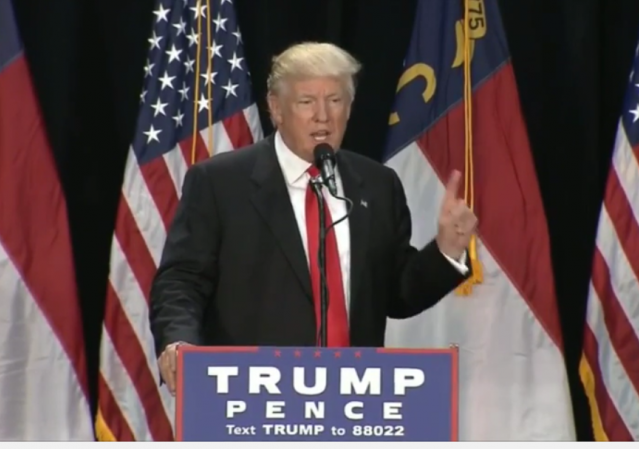Colleges Are Going to Hate Trump’s Plan to Cut The Cost of Higher Ed
Even though it would work.

This may seem blunt but in some ways, it’s exactly what American colleges and universities need to be told.
The Daily Caller reports:
Trump To Colleges: Cut Costs, Or Lose Taxpayer Cash
Republican presidential nominee Donald Trump made a daring policy proposal Thursday night, saying that as president he would pressure schools to lower tuition costs by threatening to revoke their access to federal funds if they refuse.
Trump made the announcement while campaigning in Chester Township, Pa., a suburb of Philadelphia, while discussing the steadily rising cost of college.
“If universities want access to all of these federal tax breaks and tax dollars paid for by you,” Trump said, “they have to make good faith efforts to reduce the cost of college.”
Trump didn’t offer any details on how his suggestion would work, but almost any form of implementation would cause a dramatic shake-up in college education. The vast majority of U.S. colleges are heavily dependent on the federal government because the federal government controls the student loan industry and because the federal government controls billions of dollars in academic grants to colleges.
 DONATE
DONATE
Donations tax deductible
to the full extent allowed by law.








Comments
There’s a pretty easy way to make sure that college costs go down. Make the schools get the loan money back from the Students and reimburse the government. If their graduates can’t pay back the money in the schools go out of business.
He has it backwards.
Cut the Federal cash, which will drive down the costs.
If higher education is indeed so worthwhile, the market will figure out a way to pay for it.
The entire Dept of Education should be eliminated. Education is not the job of the Federal government.
This assumes that the government gets nothing directly from the money it shovels at schools. Much like an alum making donations to his alma mater; the alum isn’t actually buying anything, so if he stops donating, he loses nothing.
However, much of the money expended by government on private universities is buying something—research on problems the government thinks merit investigation or development.
Consider, for example, the Internet. DARPAnet was something the Defense Advanced Research Projects Agency thought would be useful to make defense contractors and the US government and military better able to function after a catastrophic attack. Like NASA, DARPA itself does essentially none of the actual work; it pays other entities to do research and provide answers (i.e., reports, hardware, data, etc.). And it gets these things from primarily the heavyweight S.T.E.M. research schools, where not much money buys a lot of gruntwork by skilled and motivated grad students. Then, once DARPAnet is up and running, it’s a conceptually simple matter to expand it. It didn’t become a vital fixture in everyday life until it went .COM; in the early days it was all .GOV, .ORG, .NET, and .EDU, and those wouldn’t have happened without government money tossed at schools.
So … if government cuts off the flow of taxpayer dollars to schools, there’s a serious risk of losing technological edge in some fields.
The generally reasonable belief that if the research is actually useful the marketplace will provide funding isn’t, in this case, the full answer. Some problems are just too big for private investors to tackle with any hope of living long enough to see any return (or, just as bad, they are widely believed to be too big). The development of commercial jet engines is perhaps the classic example. Nobody would put in the money to develop jet aviation just so that lower middle class housewives could fly to Las Vegas for the weekend to blow their year’s savings in an orgy of frivolity. But the government would put in the money, because that’s the only reasonably feasible way to drop tons of high explosives on certain foreign cities and factories. Then, once the government’s paid to develop reliable jet engines, the job of commercializing them isn’t so formidable.
So, the market still rules, in general … but sometimes the details make things a bit more complicated. As long as government is actually buying something useful from schools, it’s not clear that axing the flow of funds won’t hurt the government more than it hurts the schools.
Interestingly, Jet engine research was conducted back before the days of guaranteed student loans and $40k per year tuitions.
Be that as it may, your entire comment makes the assumption that the government would have to actually follow through with its threat in any significant way.
I’m pretty sure that most universities faced with the prospect would magically find a way to cut costs quite dramatically. You may see universities cutting down on the numbers of administrative personnel…maybe even so far as to only have assistant deans, rather than assistant to the assistant to the assistant deans…and lots less “resource centers” that do nothing but pander to the whims of the perpetual victim class.
I bet you’d see a lot less professors (or, rather, their TA’s) “teaching” one or two classes per semester while knocking down 6 figure salaries too.